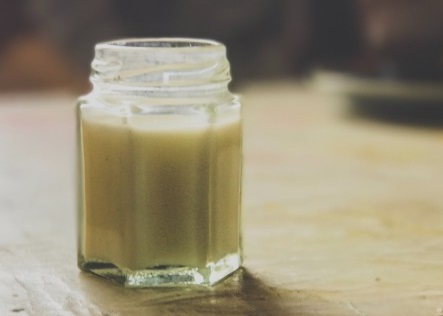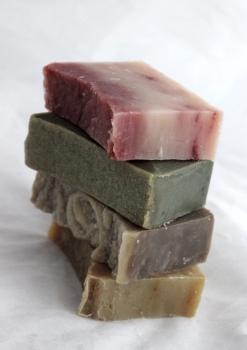The Skin Care Benefits of Whey
 If you're one of the growing number of people concerned about the chemicals we use in our beauty care products, add whey to your list of natural alternatives!
If you're one of the growing number of people concerned about the chemicals we use in our beauty care products, add whey to your list of natural alternatives!
When you open a tub of plain yogurt with active live cultures, you'll see a yellowish liquid at the top. You can either stir it back into the yogurt or wash your face with it! The liquid is called whey, and not only is it nourishing for your body, it also does wonders for your skin and hair.
Whey is the liquid portion of milk after the solids have been strained out. It is a complete protein with all of the vital amino acids.
If you make your own lacto-fermented dairy products such as yogurt or kefir, you're one step away from gaining this vital nutrient-dense food. Simply strain the yogurt or kefir through cheesecloth and watch the whey drip into the bowl. (See our Month Six Food Challenge for step-by-step instructions on making whey.)
Making the Most of Your Natural Soaps
 When you invest in a bar of natural soap, you may pay more in the short run, but more than likely you will benefit in the long run with softer skin. Your overall health will benefit as well, since more than 60 percent of anything we put on our skin is absorbed into the body. (Chemicals found in personal care products are now being linked to breast cancer, birth defects, infertility, and more.)
When you invest in a bar of natural soap, you may pay more in the short run, but more than likely you will benefit in the long run with softer skin. Your overall health will benefit as well, since more than 60 percent of anything we put on our skin is absorbed into the body. (Chemicals found in personal care products are now being linked to breast cancer, birth defects, infertility, and more.)
If the soap is truly natural, chances are it is super-fatted. This means extra oils are included in the formula for moisturizing benefit. It also means the glycerin—the rich, moisturizing byproduct of soapmaking—is stirred back into the soap.
Chemically-derived, factory-made soaps take out the glycerin while including all sorts of harsh chemicals. Your skin pays a price, although many times we aren't aware until we try a more natural product.
The problem is that factory-made soap is cheaper and it lasts longer. It's cheaper because chemicals are less expensive than the naturally-derived ingredients found in natural soaps. It lasts longer because it is not super-fatted and the glycerin is removed.
The solution? Prolong the life of your natural soap. Here are three tips for making your soap last:
The Benefits of Natural Light
 Do you suffer from mal-illumination? The term, coined by light-science pioneer John Ott, suggests that people are suffering from a lack of natural light much like those who are malnourished.
Do you suffer from mal-illumination? The term, coined by light-science pioneer John Ott, suggests that people are suffering from a lack of natural light much like those who are malnourished.
Our buildings are often dark, with few windows. Our lives are centered on computers and indoor tasks. A little outdoor time with access to full-spectrum light can go a long way toward boosting our mood and immune system.
Twenty-Five Uses for Coconut Oil
 In the Philippines, the coconut tree is known as the "Tree of Life" because of its many uses. Its roots, trunks, and husks are used for construction materials, paper pulp, brushes, and much more. Coconut oil is derived from the copra, which is the dried coconut meat.
In the Philippines, the coconut tree is known as the "Tree of Life" because of its many uses. Its roots, trunks, and husks are used for construction materials, paper pulp, brushes, and much more. Coconut oil is derived from the copra, which is the dried coconut meat.
Virgin coconut oil contains abundant medium-chain fatty acids, which are more easily digested than long-chain fatty acids. Coconut oil also contains lauric acid, which is found in breast milk and has proven antifungal and antimicrobial properties.
Coconut oil contains saturated fat, which is the most stable of all fats, and as a result coconut oil does not go rancid when heated and does not form dangerous free radicals that can cause a multitude of ills.
Coconut oil, therefore, is wonderful to cook with and to eat. But that's not all! Here are 25 ways to incorporate coconut oil into your daily life.
All-Natural Personal Care
There's good news when it comes to natural alternatives for personal care: With a few supplies and a little creativity, you can make your own personal care products. The possibilities are endless!
Supplies include:
- Glass or plastic spray bottles (available online or previously used, emptied, and cleaned well)
- Mason jars in all sizes (if using plastic tops, have a grease pencil on hand to label)
- Liquid castile soap
- Glycerin
- Raw apple cider vinegar
- Herbs such as nettles, birch, comfrey, lavender
- Essential oils such as lavender, plumeria, tea tree, lemongrass
- Rhassoul clay
Suggested sources for supplies:
- Amazon
- SoapGoods offers an abundance of personal care supplies
- Mountain Rose Herbs has a wide selection of herbs, oils, rhassoul clay, and more
- Vitacost offers an excellent variety of products, with one low shipping price for any size order
- Check your area for organic buying clubs such as Frontier Natural Products Co-op
- Whole Foods and other health food stores carry organic apple cider vinegar, essential oils, and herbs

